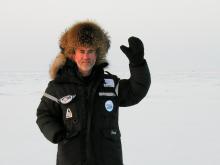Geologic Climate Research in Siberia
What Are They Doing?
An international team of researchers from the United States, Germany, Russia, and Austria traveled to northeast Russia to conduct a large-scale scientific drilling project in Lake El'gygytgyn (pronounced el'geegitgin), a crater lake created 3.6 million years ago by the impact of a meteorite measuring about 18 km in diameter. The team worked on the lake ice throughout the winter, using a customized light-weight drill rig to obtain drill cores of layered muds from two sites in the lake.
Lake El'gygytgyn possesses a unique record of prehistoric climate change in the arctic. Because this basin was never glaciated, an uninterrupted sediment sequence of nearly 400 m (1312 feet) has accumulated at the bottom of the lake. Sediment cores collected during this expedition were used to gather information about the history of the basin and were compared with similar paleoclimate records from other parts of the world, helping researchers to better understand the arctic's role in global climate change.
The team also drilled a short distance into the highly fractured rock layer below the sediments to learn more about meteorite impacts. Because of the particularly well-preserved rock structure in Lake El'gygytgyn, the team was able to learn how igneous target rocks in this area responded to impacts, potentially providing the basis for important understanding related to cratering processes on Mars.
Geologists used the data collected from the project to reconstruct past climate records on longer time scales, improve understanding of the climate system, and better inform scientists who predict future climate change.

